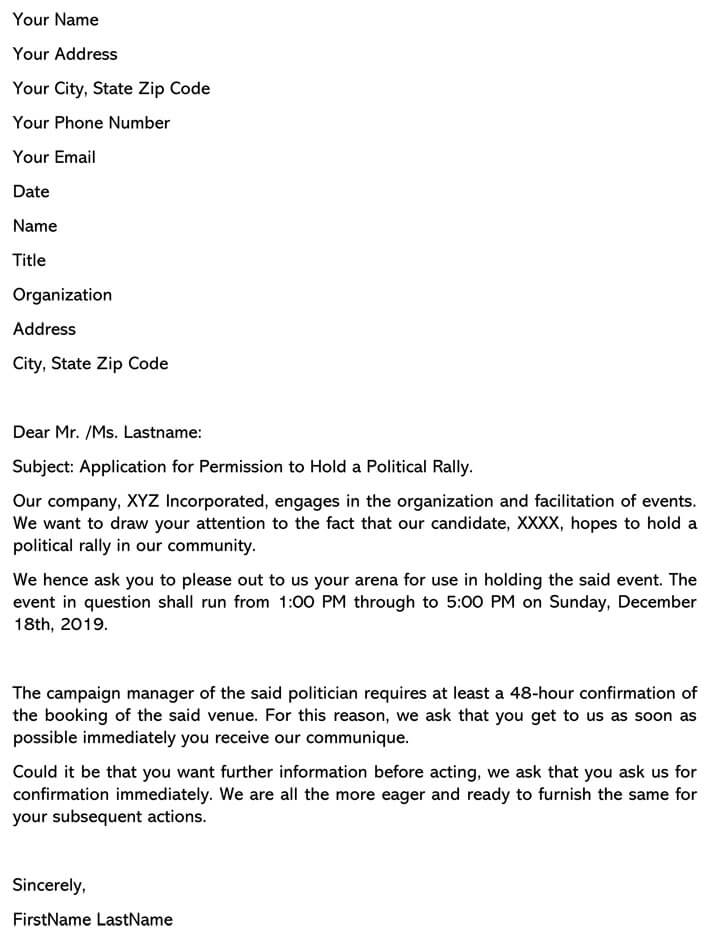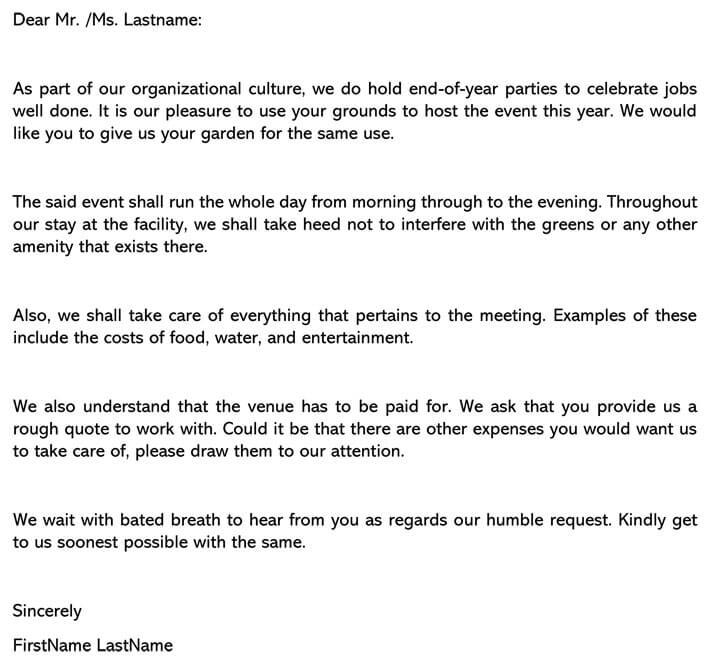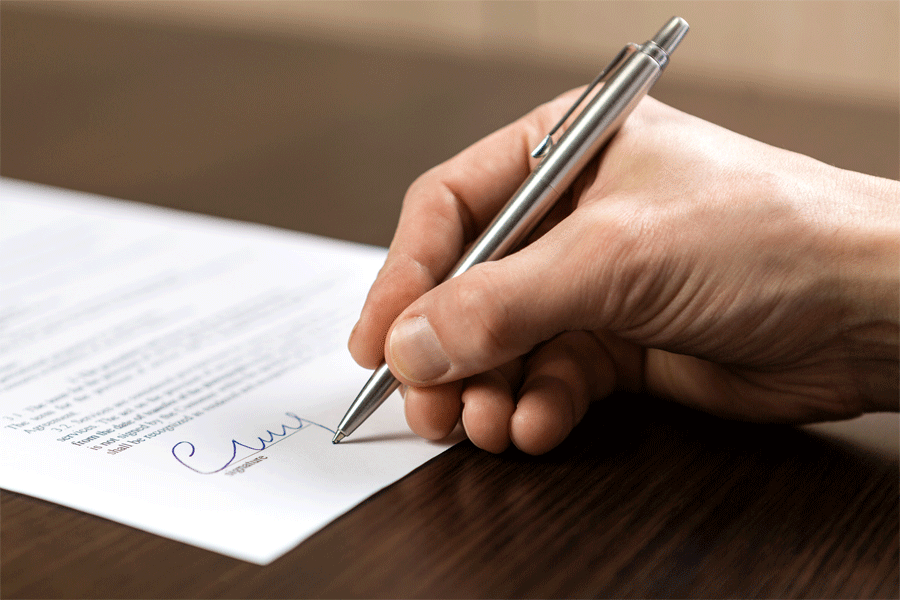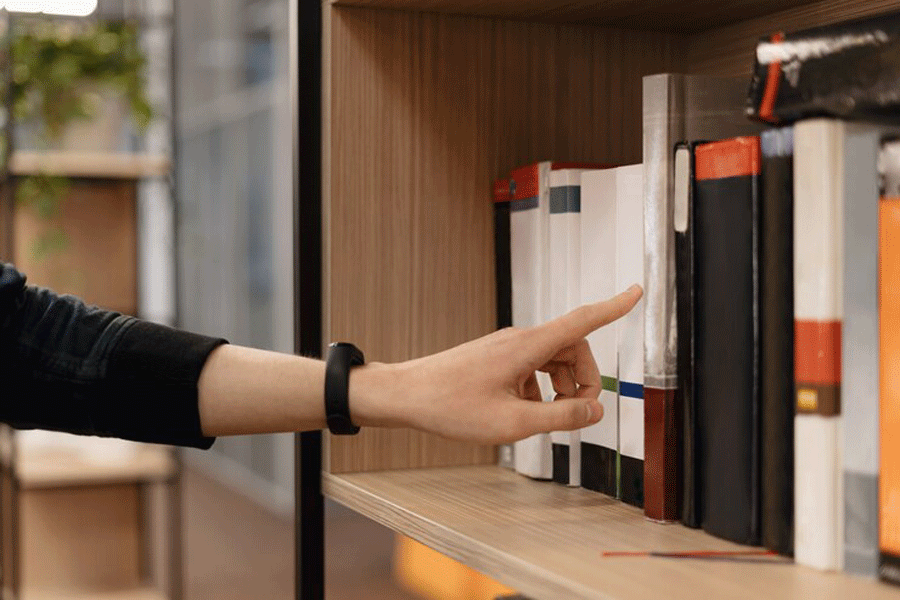A Permission Letter for an Event is a formal letter that is usually written by an individual or organization seeking allowance to use property owned by the concerned authority as a venue for an event.
This letter contains information such as the sender’s details, the type of event that will be hosted on the property, the date and time of the event, why the writer is requesting permission to use the specific property, and what approval would be needed.
It may be written by a business firm, sports club, school, or association that wants to use property owned by another individual to host their event. The permission letter is usually written before any preparations, such as advertising, brochure printing, etc., are made.
This letter aims at obtaining prior approval from the landowner/property owner, such that they are on record if the event will be hosted on their property. Seeking official permission before using a piece of property as a venue for your event is essential because it helps prevent any unnecessary legal claims such as trespassing lawsuits that may arise in the process.
This article provides a comprehensive guide on writing an effective permission letter to host an event, including formatting the letter and standard writing tips and best practices.
Downloadable Templates
How to Format a Permission Letter
Generally, the format of such a letter may vary depending on the type of event and the type of property that you want to use. However, the letter’s tone should be polite; it should be addressed correctly, include all the relevant information, and be written in clear and concise language.
The following is a step-by-step guide on how to format your letter appropriately:
Address
The letter must have a heading that contains the writer’s name and address in the top-left corner of the document. After providing the writer/sender’s name and address details, date the letter following the month/date/year format, and add the receiver’s details, including their first and last name, designation, organization name, street address, state, city, and zip code.
EXAMPLE
Michael Brown
Marketing Manager, XYZ Construction Company,
P.O. Box 72456, New York
January 6, 2022
Marylyn Angelou
Property owner
ABC premises
Applestreet 3rd Avenue road
72456 New York
Salutation
After providing the most accurate header information, begin your permission letter with a formal salutation addressed to the recipient of the letter using their correct name and designation/title. Including an appropriate salutation in your letter is vital in establishing rapport with the letter’s receiver, and it sets the right tone for the rest of the letter.
EXAMPLE
Dear Ms. Marylyn Angelou,
Subject
The letter must also include a clear subject line that is not more than six words long. The subject line should immediately communicate the exact purpose of the letter to the recipient, and it should be written in bold, underlined, and centered on the page.
EXAMPLE
Ref: Request to use ABC premises as Venue for a Marketing Campaign
Introduction
Below the subject line of the letter, write a brief introductory paragraph describing who you are, why you are writing the letter, and to whom it is addressed. While the introductory paragraph should be brief, it should also be precise enough for the recipient to grasp its full purpose immediately after reading it.
EXAMPLE
My name is Michael Brown, the marketing manager of XYZ Construction Company, a renowned construction firm based upon the strength of our quality workmanship and exceptional customer service. I am writing this letter to seek your permission to use ABC property as a venue for our upcoming marketing event. XYZ company will host the event on January 23, 2022, from 9.000am to 4:00 pm.
Body
The body of a permission letter is where the primary purpose or objective is expressed. As the name suggests, the key purpose of writing a permission letter is to obtain approval from the property owner/concerned authority to use their property as a venue for your upcoming event. The body should include all relevant information about the event and why your organization is seeking permission to host an event on the said property. This section ought to be persuasive enough to convince the property owner to allow you to host your event on their property.
The body of the permission letter to host an event on a given property can be written in two or three paragraphs, depending on the need. The first body paragraph includes information about why you are writing the letter; the second body paragraph contains information on why permission is needed; and the third paragraph explains your intentions and final request.
EXAMPLE
As you know, hosting events at your property has enabled us to grow our business brand over the years, and this year, we hope to achieve even better awareness among our customers. We believe that your property is best suited to host this event due to the following reasons:
1. It has the capacity to accommodate the number of guests we anticipate
2. It is one of the most prominent locations in town. Therefore, it will help generate the number of potential customers we anticipate and help create awareness of our business brand, its products, and the services we offer.
3. The location offers sufficient room for our tables, chairs, decorations, and basic electricity needs such as lighting.
Kindly let me know whether we can host our event on your property on the above-stated date and time in advance so that we can prepare accordingly. Besides, furnish me with the exact dollar amount of money that you shall demand in exchange for using your property as the venue for my event via my email at xnxcc@email.com or via my official business number at +1256789087
Closing
The closing of the letter should be brief and to the point. It should summarize all the reasons mentioned throughout the letter and include your contact information to make it easier for the recipient to provide relevant feedback. In addition, it should also include your signature, a printed name, and your position/designation.
EXAMPLE
I’d really appreciate it if you find it convenient to grant my organization permission to use your property as a venue for this upcoming event that will be held on January 23, 2022, from 9:00 am to 4:00 pm. My organization will make every effort to ensure that we do not cause any damage to your property, reputation, or clients. I am looking forward to a positive response from you soon.
Sample Letters
Following are a few professionally crafted samples for you so that you can develop a better understanding of the sentence structure and format of the letter:
Sample Letter 1: Corporate Event
Dear Ms. Emily Johnson,
I am writing on behalf of Zenith Innovations to request the use of the Main Auditorium at Johnson Enterprises for our upcoming corporate event scheduled for March 15, 20XX. This event, titled “Innovating for Tomorrow,” aims to bring together industry leaders to discuss future trends in technology.
Given the reputation of Johnson Enterprises for hosting successful corporate events, we believe that your auditorium, with its state-of-the-art facilities, is the ideal location for our event. We expect around 200 attendees and plan to use the space from 8 a.m. to 5 p.m., including setup and breakdown times.
We assure you that all Johnson Enterprises’ policies regarding the use of the premises will be strictly adhered to, and we are willing to provide a security deposit as assurance. Additionally, we will take full responsibility for any damages incurred during our event.
We look forward to a positive response and the opportunity to discuss further details at your earliest convenience.
Sincerely,
Ria Meyers
Event Coordinator
Zenith Innovations
Sample Letter 2: Community Event
Dear Mr. Lucas Bennett,
I am writing to you as the Chairperson of the Riverdale Arts Council, requesting permission to use the Riverdale Community Hall for our annual art exhibition, “Art in the Park,” to be held on June 5-6, 20XX.
Our event aims to showcase local artists and foster community engagement through art. We anticipate that the exhibition will attract a large number of visitors from Riverdale and surrounding areas. The hall would be required from June 4th for setup, through the event dates, and until the morning of June 7th for cleanup.
We will ensure that all activities comply with the community hall’s regulations and will arrange for our volunteers to oversee the event to maintain decorum. We are also prepared to cover any associated costs for the use of the hall.
Your support in providing a space for local artists to exhibit their work would be greatly appreciated. We eagerly await your response and hope to make this a memorable event for the Riverdale community.
Warm regards,
Kim Hailey
Chairperson
Riverdale Arts Council
Analysis
The sample permission letters provided are effective instructional guides for writing requests to use premises, demonstrating several key principles of professional communication. Firstly, they exhibit a clear and concise structure, starting with a specific subject line that immediately clarifies the purpose of the letter. This is essential in capturing the recipient’s attention and setting the context. Secondly, the introduction of each letter efficiently establishes the sender’s identity and their organization, lending credibility and relevance to the request. The body of the letters is particularly instructive, as it details the event, including dates, times, and the nature of the event, providing the recipient with all necessary information to make an informed decision.
Moreover, the letters skillfully justify the choice of venue and subtly hint at potential benefits for the venue owner, such as community engagement or exposure, which can be persuasive. Importantly, they also include assurances regarding adherence to venue policies and willingness to handle associated costs, which address potential concerns of the premises owner. This aspect of risk mitigation is crucial in such requests.
Finally, the letters conclude with a call to action, encouraging a response or further discussion, which is vital in maintaining the momentum of the request. The professional sign-off reiterates the sender’s authority or role, adding a personal yet formal touch.
Overall, these letters serve as comprehensive guides, demonstrating how to structure and articulate a request clearly, responsibly, and persuasively, making them excellent templates for similar communications.
Tips for Writing an Effective Letter
An effective permission letter should be professionally written, formatted, and appropriately presented. Described below are some practical tips to help you structure the letter in an effective way:
Keep a polite tone
The main purpose of writing the letter is to seek permission from the property owner to use their property as the venue for your upcoming event. It is the discretion of the land/property owner to let out their premises to you or not because you do not have any rights to the said property. As such, while writing the letter, use a polite tone throughout. Moreover, use a tone that implies rather than coerces the property owner to let it out to you.
Be formal
A permission letter for an event is an official letter. Therefore you need to write it formally following the accepted standard business letter format and use formal language throughout the letter. This helps make the letter more convincing to the reader and demonstrates your professionalism.
Use simple language
While writing your letter, make it a point to use straightforward language such that the property owner can easily understand why your organization is seeking permission to use the said property as a venue for your event. By all means, avoid ambiguity throughout the letter and refrain from using any technical jargon. Also, avoid constructing long sentences which may be hard to read/follow.
Be concise
Provide only the most essential and relevant information in your letter and avoid being too wordy. This is because the letter’s recipient might not read through your entire letter before answering if they find that it is too long or tedious.
Proofread
Before sending out the letter to the concerned authority, take time to read through it to identify any spelling or grammatical mistakes that you may have made while writing it and edit it accordingly. In addition, consider giving the letter to a trusted friend or someone within your organization to proofread it and provide feedback on the document’s quality.
Final Thoughts
A permission letter is a formal request to allow the use of the property of another individual or entity as a venue for an event. These letters are usually written in different formats, but they generally include information regarding which entity is seeking permission, who the property owner is, what activity will take place on the stated property, and the event’s exact date and time.
It should be formal and clear so that the recipient can understand it thoroughly. Moreover, it should follow the standard business letter format, be as specific as possible, and include only the relevant information to persuade property owners to allow you access to their premises for use to further a particular course.














